- Home
- Hilary Mantel
Eight Months on Ghazzah Street Page 4
Eight Months on Ghazzah Street Read online
Page 4
“There are different rules for us,” Parsons said, barely removing the pipe from his lips. “Never forget, Andrew, that as individuals we are very unimportant in the Saudi scheme of things. We are only here on sufferance. They do need Western experts, but of course they are a very rich and proud people and it goes against the grain to admit that they need anyone.”
It had the air of a speech that had been made before. Andrew said, “Do you mean that they are rich and proud, or are they just proud because they are rich?”
Parsons did not answer. Andrew was surprised at himself. It was more the question that his wife would have asked. The Deputy Minister had gained his Daimler now, and put the electric window down to converse further with his hangers-on. Andrew felt slightly nauseated from the cups of cardamom coffee which he had not known how to refuse. He felt exasperated by his inability to draw any proper human response from Parsons, anything that was not practiced and emollient. “Is Turadup very unimportant as well?” he asked.
Parsons took out his pipe again, and made the sort of movement with his mouth, a twitch of the lip, which in some Englishmen replaces a shrug. “We have the contract for the building,” he said, “and for the silos at the missile base, and for a few billion riyals’ worth of work in Riyadh, but of course if they go off us they can always run us out of the place and hand out the work elsewhere. I mean they don’t have the constraints, you see, that you find in the rest of the world. But then on the other hand the company has its Saudi sponsor, and that sponsor gets his percentage, and is of course an even more highly placed gent than that gent you see over there; and think of the incidental profits we bring in, the rents and so on. I suppose you could say that as a company we are not entirely unimportant. But as individuals we are not expected to make our mark. The best we can do, as individuals, is to keep out of trouble.”
The Deputy Minister had put his window up now, and driven away. Almost as soon as the Daimler drew out of the gate a straggle of Saudi staff members emerged from the Ministry’s main door and began to head for their cars; it was one-thirty already, and at two-thirty government offices shut down for the day.
“Ah, homeward bound,” Parsons said pleasantly, “as we should be, I think, or at least, back to the old Portakabin, eh? I tell you what, Andrew, the best thing is, get into your own little routine. It isn’t easy to get things done but I’ve found over the years that there’s a certain satisfaction in achieving against the odds. Now of course you’ll hear chaps like Pollard sounding off about the Saudis, that’s their privilege, but what good does it do? You may as well learn to take the rough with the smooth.”
They had walked together to Eric Parsons’s car. Parsons wound down the window for a moment, to let out the hot wet air trapped inside, and then wound it up again as the air-conditioner cut in. “Bought a little Japanese motor, didn’t you?” Parsons said. “How’s she running?”
“Fine,” Andrew said absently. “Fine.”
He still felt sick. I was in that bloke’s office for twenty minutes, he thought, and he didn’t speak to me once.
Parsons said, “You seem a steady type, Andrew, to me. You’ll feel less strange when your wife comes out, there’s nothing like family life to keep you going in this place. Keep your head down, you’ll be all right.”
Later that night he tried to write to Frances. He struggled to get the words on to the page. He imagined her, in her red dressing gown perhaps, picking up the morning post in her mother’s hall. He felt that he had not succeeded in describing the incident at the Ministry in any terms that would make sense to her. Was he sending her the right information at all? It was almost as if there was something desperately important that he should be telling her; and yet he had no idea what it was.
He had been carrying around, since they parted at Jan Smuts Airport, a small photograph of his wife. It was necessary to get a couple of dozen, passport size, for all the formalities that taking up residence in the Kingdom entailed, and he had clipped one off, and put it in his wallet. He took it out and looked at it. Frances was thirty years old, perhaps looked and seemed younger, looked younger in this photograph: five feet tall, slight, neat. That is how I would describe her, he thought, how I suppose I have described her to Daphne Parsons, who asked in her condescending way, “And what is your little wife like?” She had (but he did not go into such detail for Daphne) a freckled skin, and light brown hair, which formed a frizzy nimbus around her head, the result of an unfortunate perm; a small mouth, and light, curious eyes: of no particular color, perhaps hazel. He had said to Mrs. Parsons, “Frances will be here soon, you can see for yourself.” Why should she think he would have a little wife?
Frances will be here soon, with her precise inquiries and her meticulous habits. She is the sort of person who rings dates on calendars, and does not trust to memory; who, when she writes a check, does a subtraction and enters the balance on the stub. She knows where all their possessions are, everything that belongs to her and everything that belongs to him; she remembers people’s birthdays, and retains telephone numbers in her head. She likes to make sense of the world by making lists, and writing things down. Perhaps, he thought, she will keep a diary. He picked up his pen to add another sentence, laboriously, to the letter: I am really missing you, Fran. He felt weak from missing her, and ashamed of his weakness, so he took her photograph and laid it, facedown, on the table.
Frances Shore’s Diary: 4 Muharram
The first thing I did was to go around the flat drawing back the curtains. This does not seem to me to be a particularly good way to start a diary, but it seems necessary to put down everything I did the first morning, so that I can be sure that I really did as little as I thought, and yet time did pass and I got through it. It reminded me of a particular day in Africa, when I was in our house alone, at home because I had been ill, and I was lying in bed. I’d had tick-bite fever but I was over it, still weak and full of aches and pains, and with no energy to do anything. The house was very quiet, because the maid was having her holidays and the dogs were asleep, and outside rain was falling steadily, that gray carpet of rain that used to come down sometimes for days on end. I remember that morning creeping by, in self-pity and looking at my watch every few minutes, and I couldn’t imagine how time could move so slowly. Our bedroom was in semidarkness, because I had wanted it that way when my head hurt so badly, and now although the pain had gone I didn’t have the strength or initiative to get out of bed and let in what little light there was from outside. I felt utterly unreal on that day, and utterly alone, as if I were drifting on some tideless gray sea.
Feeling this on my first morning in Jeddah, I blamed fatigue, and the upset of flying, and self-pity again, because I wasn’t entirely sure that I wanted to be here. But although flying does sap the energy it isn’t as bad as tick-bite fever, and besides, years have passed since then, and I have taken myself more in hand. So this time I did go and open the curtains.
The curtains are the kind that look as if they are made out of knitted porridge. The carpet is beige and the wallpaper is beige and so is most of the furniture.
When I drew back the curtains I couldn’t see out. There are blinds on the outside made of wooden slats, and hidden behind the curtains is a mechanism for raising them. In the living room the blinds were not down, and when I drew back the curtains I realized that this was the view I had treated myself to on what Andrew called my predaum tour. It was a wall.
I felt that I was getting frustrated now—first blinds, then wall. I walked around the flat and looked out of each window in turn: bedroom one, wall; bedroom two, wall; bedroom three, wall. And into the kitchen, but the kitchen doesn’t have a window, though it does have the side door with a frosted glass panel. But that door was locked and I hadn’t found any keys. I went into the bathroom, which has a small frosted window which slides. So I slid it. And there was the wall.
I suppose I hadn’t realized last night that it ran right round the apartment block. But I don’t thin
k I’d expected a garden. There is one tree, the tree that I saw at dawn. It has a brown trunk and brown leaves.
I am keeping this diary so that I can write letters home. People expect you to have something exciting to tell them, though the truth is that once you have been in a place for a few weeks it is not exciting, or if it is, then it is not exciting in a way that the people at home understand or care for. By and large people at home are not interested in hearing about your experiences. They feel bound to put you in your place, as if by going away at all you were offering some sort of criticism of their own lives.
When I was back in England waiting for my visa, I went over to Scarborough to see my cousin Clare. We used to get on pretty well before I went abroad. I took some photographs with me, of our house and garden in Botswana, which was probably a mistake and a boring thing to do, but it wasn’t a bad enough thing to account for those whiffs of hostility I kept getting from Clare. She said, I can’t think what induces you to live in such places, I never would. And then she said, I suppose Andrew can’t get a job at home? So I said, not at his new salary. I told her what it was, and that shut her up.
It doesn’t matter, though, how uninterested people are, you still have to write them letters. And I have a feeling that very little will happen here. I couldn’t, for instance, write much on The View From Our Front Window. Andrew says that your first impression of the Kingdom is that it is a stable and orderly place where the telephones work (when you can get one) and the household rubbish is collected every morning from your front gate. I know Clare will not want to read that. But I thought that if I write my diary every few days—I know I can’t manage every day—then if anything happens at all, I can make more of it in my letters home.
This is a new departure for me. In Africa there was no need to keep a diary to convince yourself you had an interesting life. Things were always happening. The garden boy would get syphilis, for instance. Perhaps it is a relief not to have household help.
I found myself looking around the flat that first morning, thinking rather desperately, I wish this would get dirty, then I could clean it. Which is not at all my usual sort of wish.
I went into the kitchen and moved the food around in the fridge. I looked in the cupboards to see if I could make a list of what we needed, but we didn’t seem to need anything. I went into an empty bedroom and moved a packing case into it, so that it looked more occupied. But I did not feel at all in possession of the ground.
Then I unpacked my cases. The customs men had churned everything into a knot, and I found that one of my shoes was missing. Only one, and there I was with the other shoe in my hand, new and unworn, and although I knew that my feelings were out of proportion I felt overwhelmed by a terrible sense of waste, and I thought damn them, damn those customs men, who do they think they are, and I said out loud, damn, damn, damn. Then I put most of my clothes in the washing machine and ironed the rest, and hung them in the wardrobes, and it was still only half past eleven.
I walked around the flat, thinking dire kinds of thoughts, such as, here I am, here I stay. I went into the bathroom and there, sitting in the washbasin, was the biggest cockroach I have ever seen. I looked at it for some time in a kind of admiring revulsion. Then the thought came to me that there were other people in the building, other lives going on around mine. I heard the distant ring of a telephone, and footsteps in the flat above. It seemed to wake me out of a dream. I can’t go on like this, I thought, just wandering round aimlessly.
I went into the living room. There aren’t, as I’d thought earlier, a dozen armchairs, but there are eight, scattered here and there, and two long overstuffed oatmeal-colored sofas. When there are so many choices there doesn’t seem to be any reason for sitting in one chair and not another, so I stood there for a while thinking about it. Eventually I took the chair nearest the window, and sat in it rather stiffly, as though someone were watching me, and read the paperback I’d been reading on the flight. This made me feel as if in fact I hadn’t arrived at all, as if I were still in transit, with my passport in my handbag, waiting for it all to begin.
After a few minutes I got up and put on the overhead light, and I thought, that will always be necessary, how depressing, because I hate the lights on during the day. It was very quiet. I heard the prayer call at noon. It seemed strange not to speak to another person all morning, and yet to know that people were there, in the flat next door, and up above my head, and in the street beyond the wall, and that there was a whole country out there which I had not yet seen.
At about two o’clock the cockroach entered the room. It strolled across the huge expanse of carpet and began to climb up one of the curtains. Somehow I was quite glad to see it.
On that first day, Andrew came home at half past three. She followed him around the flat. “Will it always be like this?” she asked.
Preoccupied, he dumped his briefcase on the table. “I’m sorry I locked you in.”
“What about going out? How do I get around?”
“I’ll have to talk to Jeff Pollard to see if the office can let you have a car to go shopping sometimes.”
“I’m not that fond of shopping, you know?” she said mildly. Andrew flipped the briefcase open and took a sheaf of papers out. He began to flick through them. “Well, I don’t know that besides shopping there’s much else to do.”
“How do people get to see their friends?”
“I suppose they must come to some arrangement. Some of the women hire their own drivers. I don’t think we can afford that.”
“Are there buses? Can I go on the bus?”
“There are buses.” He had found the piece of paper he wanted and was reading it. “But I don’t think it’s advisable to take them.”
“What’s wrong?” she said. “What’s the matter?”
“Oh, nothing. Just a bad day.”
“Can’t you tell me?”
“No, I don’t think I could begin to explain.” He tossed the papers back into his briefcase and snapped it shut. Need we sound so much like a husband and wife? she wondered. We have never had this conversation before. It is as if it came from some central scripting unit.
Andrew crossed the room and threw himself into an armchair. She followed him. This big decision again; none of the chairs was so placed that they suited two people who wished to sit companionably, and talk to each other. It would seem unreasonably portentous to start moving the furniture now; although it was true that he had been in the house for ten minutes, and had not looked at her once, and this in itself seemed unreasonable. She chose a chair, rather at an angle from his own, and leaned back in it, trying consciously to relax; or at least to capture the appearance of it.
“I was tidying up,” she said, “filing papers away. I couldn’t find your passport.”
“It’s in the safe at the office. Turadup keep it. I’ve got this identity document, it’s called an iquama.” He produced it from his pocket and tossed it to her. “I have to carry my driver’s license too. If the police stop you and you haven’t got your documents they take you off to jail till it’s sorted out. They’re very keen on establishing who people are, you see, because of illegal immigrants. People come in at the end of the summer to do their pilgrimage to Mecca and then they try to get a job. I think there’s some kind of black market in servants. They try to make a few bucks and get back to Kerala or wherever before the police catch up with them.”
“I can’t think that the police would mistake you for somebody’s illegal houseboy.”
“Well, what are you saying? That they should only stop people with certain colors of skin?”
“That would be the practical recommendation.”
“Oh, there’s no color prejudice in Saudi Arabia. At least, that’s the theory. Somebody told me that when marriage settlements are negotiated the girl’s skin is a major consideration. If the bloke’s never seen her without her veil, I suppose he has to weigh up her brothers’ pigmentation and take it on trust … What were we talk
ing about?”
“Your passport. Can’t you bring it home? You never know … suppose something went wrong and we had to leave suddenly?”
“Having a passport wouldn’t be any use. You can’t go out of the country just like that. You have to apply for an exit visa. You need signatures. An official stamp.” Andrew pushed his iquama back into his pocket. He didn’t mean to be parted from it. “If you want to leave you need permission from your sponsor. My sponsor’s His Royal Highness the Minister. Your sponsor is me. If you wanted to go to another city even, I’d have to give you a letter.”
“Would you? And that would be true if I were a Saudi woman?”
“Oh yes. You can’t just move around as you like.”
“It reminds me of something,” she said. “The pass laws.”
“It’s not that bad. A lot of countries have these rules. It’s just that we’ve spent most of our lives subject to a different set. This isn’t a free society. They haven’t had any practice at being free.”
“Freedom isn’t a thing that needs practice,” she said. “If you have it, you know how to use it.”
“I don’t know. Perhaps.” He sounded very tired. “We’re not quarreling, are we? I can’t do anything about the system, we’ll have to make the best of it, and most of it needn’t bother us and is no concern of ours.” They sat in silence for a moment. “The first thing is to find out,” he said at last, “how to make daily life tolerable for you. I shall go and see Pollard and insist that he gets on to the telephone company. And we’ll have to have that doorway unblocked, so you can talk to the neighbors.”
“Do we need to have those blinds down?”
“We do at night. They’re a security precaution. Against burglars.”
“I didn’t think there’d be burglars. I thought they cut people’s hands off.”
“They do. You get reports of it in the papers.”

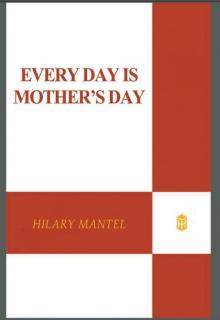 Every Day Is Mother's Day
Every Day Is Mother's Day An Experiment in Love
An Experiment in Love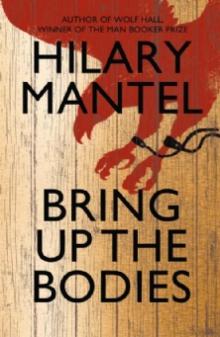 Wolf Hall
Wolf Hall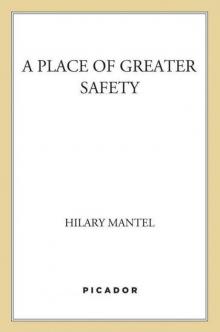 A Place of Greater Safety
A Place of Greater Safety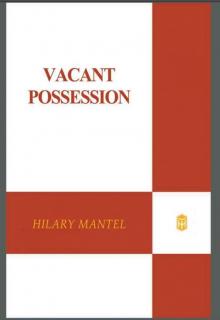 Vacant Possession
Vacant Possession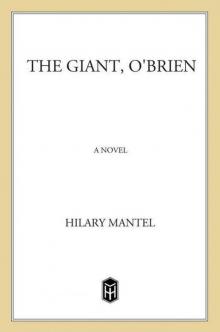 The Giant, O'Brien
The Giant, O'Brien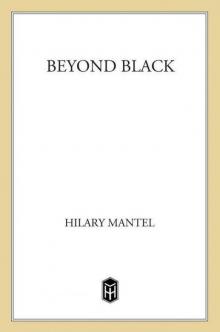 Beyond Black
Beyond Black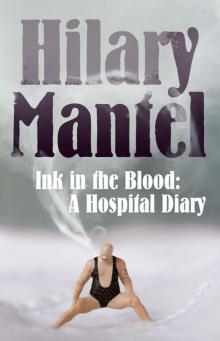 Ink in the Blood: A Hospital Diary
Ink in the Blood: A Hospital Diary The School of English
The School of English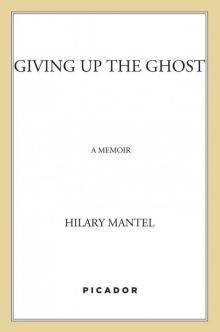 Giving Up the Ghost
Giving Up the Ghost The Mirror and the Light: 2020’s highly anticipated conclusion to the best selling, award winning Wolf Hall series (The Wolf Hall Trilogy, Book 3)
The Mirror and the Light: 2020’s highly anticipated conclusion to the best selling, award winning Wolf Hall series (The Wolf Hall Trilogy, Book 3)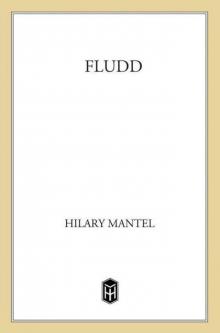 Fludd
Fludd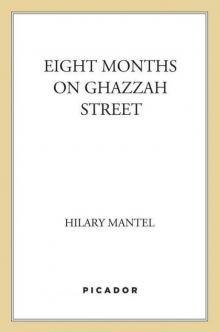 Eight Months on Ghazzah Street
Eight Months on Ghazzah Street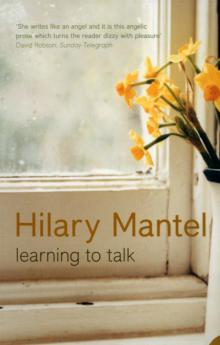 Learning to Talk
Learning to Talk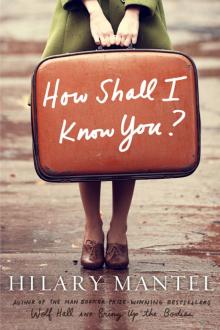 How Shall I Know You?: A Short Story
How Shall I Know You?: A Short Story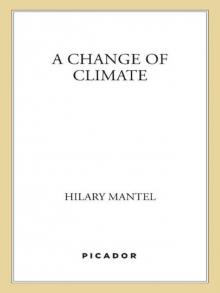 A Change of Climate
A Change of Climate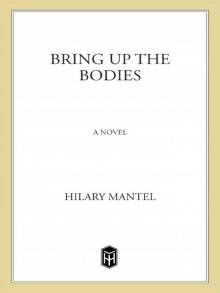 Bring Up the Bodies
Bring Up the Bodies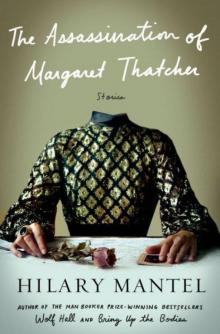 The Assassination of Margaret Thatcher: Stories
The Assassination of Margaret Thatcher: Stories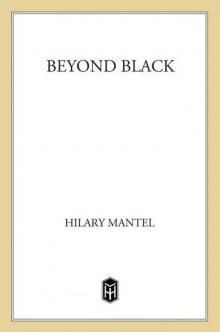 Beyond Black: A Novel
Beyond Black: A Novel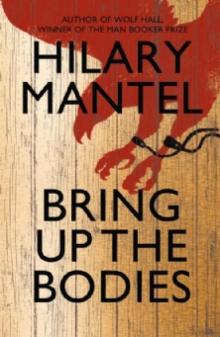 Wolf Hall: Bring Up the Bodies
Wolf Hall: Bring Up the Bodies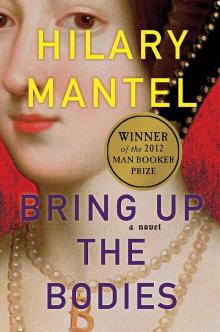 Bring Up the Bodies tct-2
Bring Up the Bodies tct-2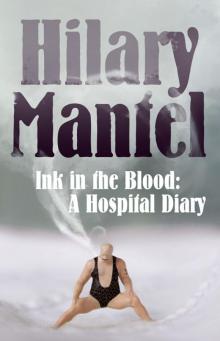 Ink in the Blood
Ink in the Blood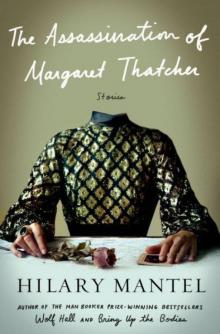 The Assassination of Margaret Thatcher
The Assassination of Margaret Thatcher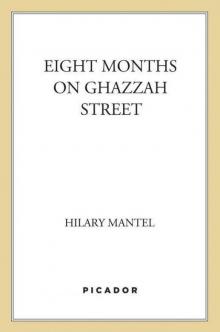 Eight Months on Ghazzah Street: A Novel
Eight Months on Ghazzah Street: A Novel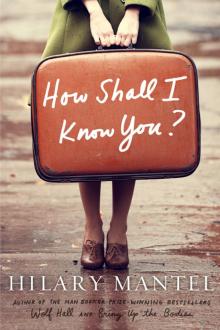 How Shall I Know You?
How Shall I Know You?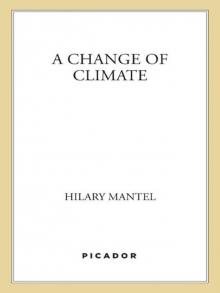 A Change of Climate: A Novel
A Change of Climate: A Novel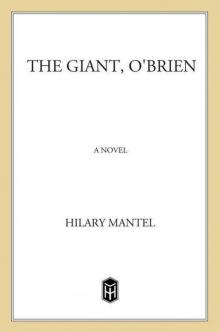 The Giant, O'Brien: A Novel
The Giant, O'Brien: A Novel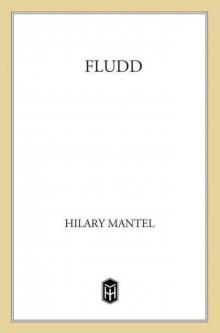 Fludd: A Novel
Fludd: A Novel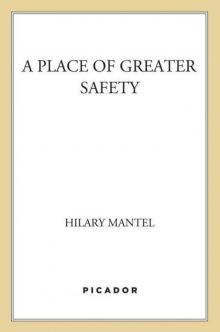 A Place of Greater Safety: A Novel
A Place of Greater Safety: A Novel An Experiment in Love: A Novel
An Experiment in Love: A Novel